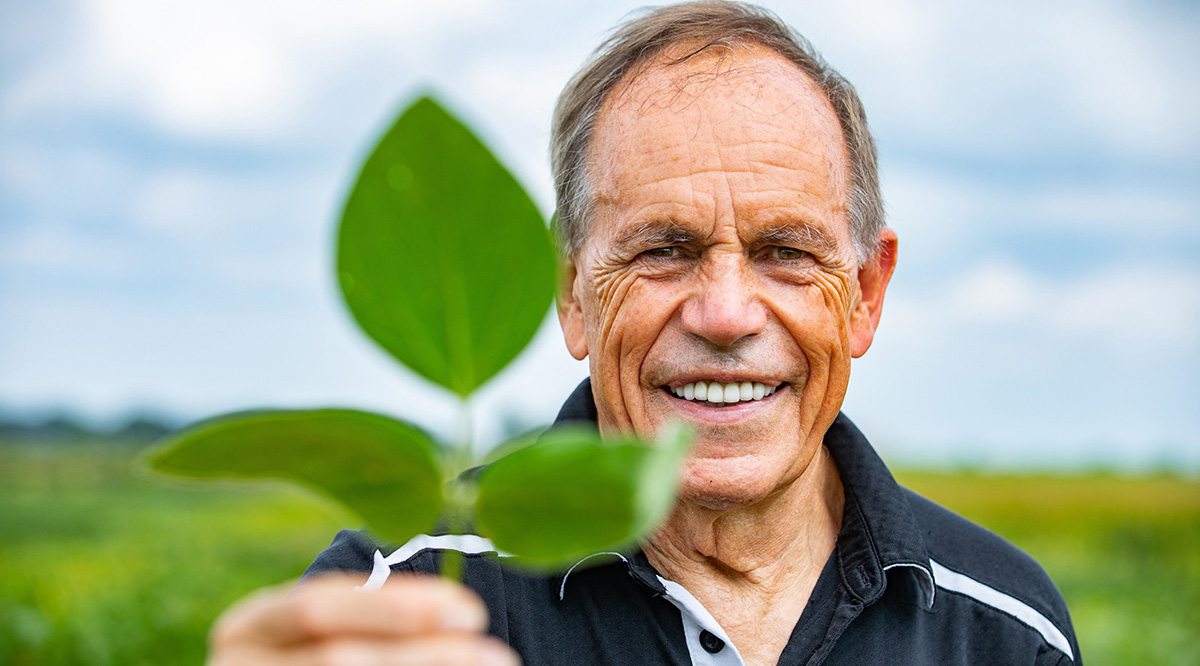In TED Talk, Long describes three photosynthetic changes that boost crop yields

In a TED Talk, Stephen Long, a professor of plant biology and of crop sciences at the U. of I., describes his and his colleagues’ work to improve photosynthetic efficiency in crops. Multiple published studies demonstrate their innovations dramatically increase crop yields. / Fred Zwicky
In a newly released TED Talk, Stephen Long (BSD/CABBI/GEGC), a professor of plant biology and crop sciences, detailed his and his colleagues’ efforts to boost photosynthesis in crop plants. He described three interventions, each of which increased crop yields by 20% or more.
Long is the director of the Realizing Increased Photosynthetic Efficiency project at the IGB. RIPE is an international research effort dedicated to improving photosynthesis to address worldwide food shortages. The project offers its technological advances to farmers in poorer regions of the world royalty-free, Long said.
“Photosynthesis is the most studied of all plant processes,” he told his audience at a TED Conference in Vancouver, Canada. “And from that knowledge, we realize that even our most productive crops are only achieving about one-fifth of the potential efficiency of that process.”
To better understand these inefficiencies, Long and his colleagues modeled the 170-step process of photosynthesis on a computer, creating what he called a “digital twin.” The model identified three bottlenecks, each of which could be addressed by increasing levels of specific proteins associated with those steps or by adding new proteins.
One change involved boosting amounts of a naturally occurring enzyme known as SbPase, which the model revealed was present in short supply.
“We put in extra copies of the genes coding for that protein. We made more of it. We got more photosynthesis. We got a higher yield,” Long said. “But we wondered why evolution or breeder selection had not already done this.”
When a colleague suggested that plants evolved in an atmosphere with much lower carbon dioxide levels than present today, the team ran more simulations – one with lower atmospheric CO2 and one with levels expected in the future. This revealed that current levels of SbPase in plants were optimal for much lower atmospheric CO2 levels than exist today and that increasing SbPase would bolster photosynthetic efficiency at the higher CO2 concentrations.
A second study from researchers at RIPE boosted plant productivity by adding a metabolic pathway to reduce energy lost when plants process the byproducts of photorespiration.
A third line of research altered the process by which plants turn up and turn down photosynthesis in their leaves in full sun or when shaded by other leaves. Simulations revealed that these intraleaf adjustments are normally so slow that they “cost plant productivity an estimated 20% to 40%,” Long said. The team identified three proteins that, when increased, allowed plant leaves to adapt more quickly to fluctuations in light.
“And in soybeans on our farm, we got more than 20% increase in seed yield,” he said.
Each of these interventions was tested in the laboratory and in experimental fields at the U. of I.
“I hope I’ve shown to you that by boosting photosynthesis, we can relieve the risk of food insufficiency for some of the most vulnerable, we can protect the environment by preventing the need to go on to yet more land to produce our food, and the possibility that we might even be able to remove carbon dioxide from the atmosphere,” Long said.
A screening of Long’s TED Talk will be featured at an upcoming community event on the Urbana-Champaign campus in 2024. Fill out a brief form to receive updates and details.

